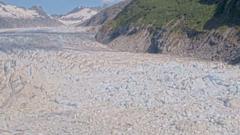As the administration moves to reduce climate-related measures, experts warn of severe consequences for national readiness against environmental threats.
Trump's Rejection of Climate Science Strains US Preparedness

Trump's Rejection of Climate Science Strains US Preparedness
The Trump administration's policies reflect a growing disregard for climate change data and research.
The Trump administration has recently taken significant steps to minimize the importance of climate change, a maneuver that critics argue jeopardizes the nation's understanding and response to escalating climate issues. In a notable policy shift, the administration announced it would largely neglect the economic implications of climate change when implementing new regulations.
This move is seen not only as an attempt to ignore the realities of a warming planet but also as a systematic effort to dismantle the frameworks used to monitor climate change. Key scientific research has been curtailed, with the administration dismissing several top scientists and discontinuing federal tracking of greenhouse gas emissions, a practice upheld for over a decade.
Reflecting on this, Agriculture Secretary Brooke Rollins emphasized a departure from climate-focused discussions, stating, "We’re not doing that climate change, you know, crud, anymore." Experts like Daniel Swain, a climate scientist from UCLA, express concern that by erasing critical data, the administration seeks to suppress a unified conversation about climate change.
Additionally, decreasing funding and resources for the National Weather Service and restricting disaster relief from FEMA further weaken the country's preparedness against extreme weather fueled by climate change, including hurricanes, droughts, and wildfires. Swain notes, "The concept of any shared factual reality has disappeared, which poses challenges to effective planning and recovery." As the consequences of climate change loom large, experts warn that the measures being taken by the Trump administration could have lasting negative impacts on America’s environmental and economic resilience.
This move is seen not only as an attempt to ignore the realities of a warming planet but also as a systematic effort to dismantle the frameworks used to monitor climate change. Key scientific research has been curtailed, with the administration dismissing several top scientists and discontinuing federal tracking of greenhouse gas emissions, a practice upheld for over a decade.
Reflecting on this, Agriculture Secretary Brooke Rollins emphasized a departure from climate-focused discussions, stating, "We’re not doing that climate change, you know, crud, anymore." Experts like Daniel Swain, a climate scientist from UCLA, express concern that by erasing critical data, the administration seeks to suppress a unified conversation about climate change.
Additionally, decreasing funding and resources for the National Weather Service and restricting disaster relief from FEMA further weaken the country's preparedness against extreme weather fueled by climate change, including hurricanes, droughts, and wildfires. Swain notes, "The concept of any shared factual reality has disappeared, which poses challenges to effective planning and recovery." As the consequences of climate change loom large, experts warn that the measures being taken by the Trump administration could have lasting negative impacts on America’s environmental and economic resilience.






















